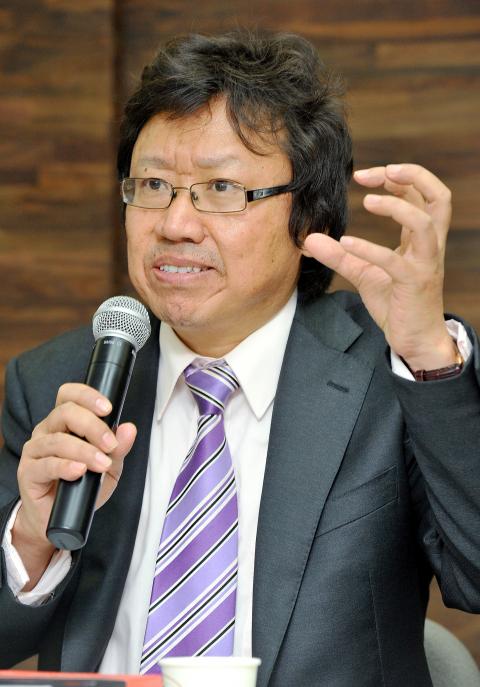Despite the more liberal background of newly sworn-in Chinese Communist Party (CCP) General Secretary and Vice President Xi Jinping (習近平), exiled Chinese democracy activist Wilson Chen (陳破空) said he does not expect substantial changes when Xi takes over as president because he is surrounded by members of the old guard.
“Some people do have some expectations of Xi when he takes office as the new president of China because of his liberal background, but I must say that I’m rather pessimistic about it,” Chen, a US-based researcher on Chinese politics, told a forum co-organized by the Taiwan Friends of Tibet and the Taiwan Association of University Professors yesterday on the potential policy direction of the new Chinese leadership toward Taiwan and Tibet.
“People have some expectations of him, because his father, Xi Zhongxun (習仲勛), one of the founding members of the CCP and the People’s Republic of China, was a liberal-minded person who had a friendly relationship with exiled Tibetan spiritual leader the Dalai Lama, and was opposed to the violent crackdown on the student demonstration on Tiananmen Square in 1989,” Chen said.

Photo: Chien Jung-fong, Taipei Times
“Most of the children of the CCP’s founding leaders are able to continue the political tradition of their parents — Xi Jinping is no exception, as he has earned a good name during his political career serving in local offices,” Chen said.
However, Chen said he was pessimistic on what Xi Jinping may do to instigate a political reform, as he is surrounded by conservatives.
He said that as Xi Jinping climbed to the CCP’s top position, the party’s conservatives launched a counterattack by placing members of the old guard around him to keep an eye on him and prevent him from imposing policies that may hurt their interests.
“Hence, I don’t see a potential for substantial changes in Chinese policies toward Taiwan and Tibet,” Chen said.
Lashing out at the CCP’s policy in Tibet, Chen said it should end its religious repression of Tibet, as religion is the core of Tibetan culture.
“Let’s not talk about what happened in 1959 or 1989 [when massive resistance by Tibetans was met by violent crackdowns]. The policy of requiring Buddhist monasteries to hang portraits of Chinese political leaders is a huge humiliation and disrespect for Tibetan culture,” Chen said. “Can you imagine the Taiwanese government requiring all temples in Taiwan to hang a portrait of President Ma Ying-jeou (馬英九) or the US government requiring all churches in the country to hang a portrait of [US] President [Barack] Obama? That’s unthinkable.”
Chen expressed regret that the Taiwanese government had declined to issue a visa to the Dalai Lama, which he said compromised the values of freedom, democracy and human rights.
“When China says that everything could be discussed under the premise of the ‘one China’ principle, Taiwan should set human rights values as the premise for cross-strait talks,” Chen said. “Many western countries have successfully forced China into dialogues on human rights, so should Taiwan.”

Alain Robert, known as the "French Spider-Man," praised Alex Honnold as exceptionally well-prepared after the US climber completed a free solo ascent of Taipei 101 yesterday. Robert said Honnold's ascent of the 508m-tall skyscraper in just more than one-and-a-half hours without using safety ropes or equipment was a remarkable achievement. "This is my life," he said in an interview conducted in French, adding that he liked the feeling of being "on the edge of danger." The 63-year-old Frenchman climbed Taipei 101 using ropes in December 2004, taking about four hours to reach the top. On a one-to-10 scale of difficulty, Robert said Taipei 101

Nipah virus infection is to be officially listed as a category 5 notifiable infectious disease in Taiwan in March, while clinical treatment guidelines are being formulated, the Centers for Disease Control (CDC) said yesterday. With Nipah infections being reported in other countries and considering its relatively high fatality rate, the centers on Jan. 16 announced that it would be listed as a notifiable infectious disease to bolster the nation’s systematic early warning system and increase public awareness, the CDC said. Bangladesh reported four fatal cases last year in separate districts, with three linked to raw date palm sap consumption, CDC Epidemic Intelligence

Two Taiwanese prosecutors were questioned by Chinese security personnel at their hotel during a trip to China’s Henan Province this month, the Mainland Affairs Council (MAC) said yesterday. The officers had personal information on the prosecutors, including “when they were assigned to their posts, their work locations and job titles,” MAC Deputy Minister and spokesman Liang Wen-chieh (梁文傑) said. On top of asking about their agencies and positions, the officers also questioned the prosecutors about the Cross-Strait Joint Crime-Fighting and Judicial Mutual Assistance Agreement, a pact that serves as the framework for Taiwan-China cooperation on combating crime and providing judicial assistance, Liang

US climber Alex Honnold left Taiwan this morning a day after completing a free-solo ascent of Taipei 101, a feat that drew cheers from onlookers and gained widespread international attention. Honnold yesterday scaled the 101-story skyscraper without a rope or safety harness. The climb — the highest urban free-solo ascent ever attempted — took just more than 90 minutes and was streamed live on Netflix. It was covered by major international news outlets including CNN, the New York Times, the Guardian and the Wall Street Journal. As Honnold prepared to leave Taiwan today, he attracted a crowd when he and his wife, Sanni,